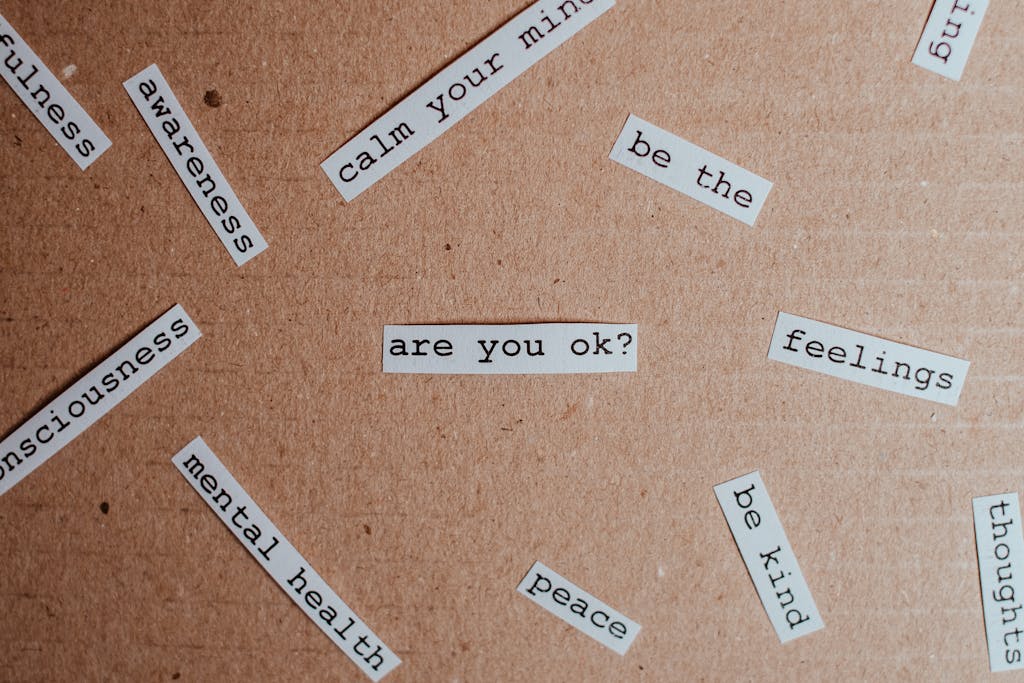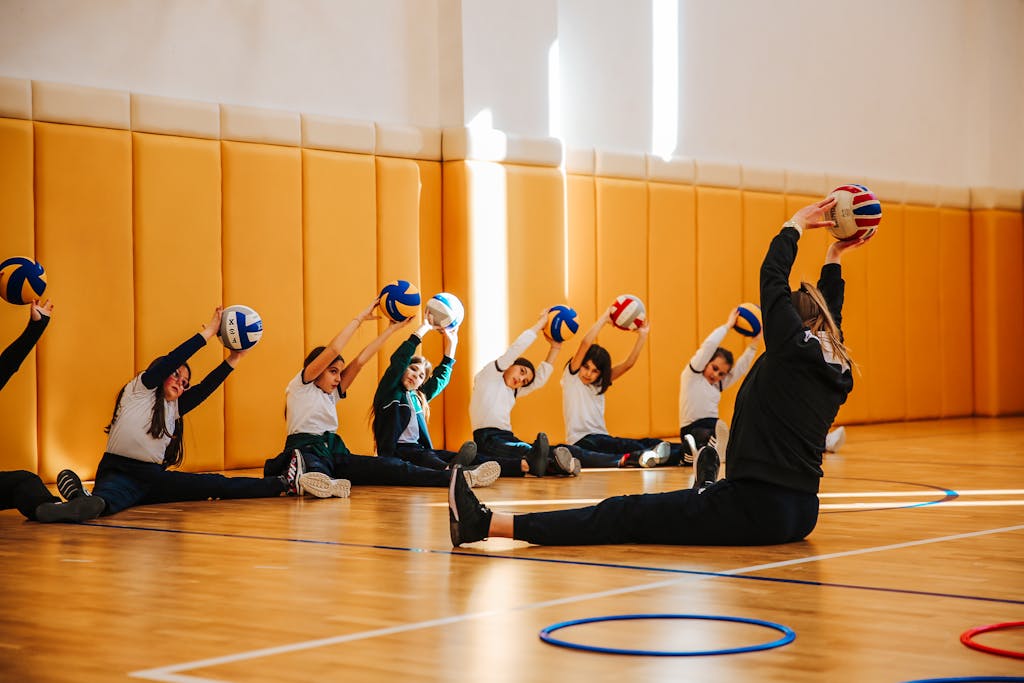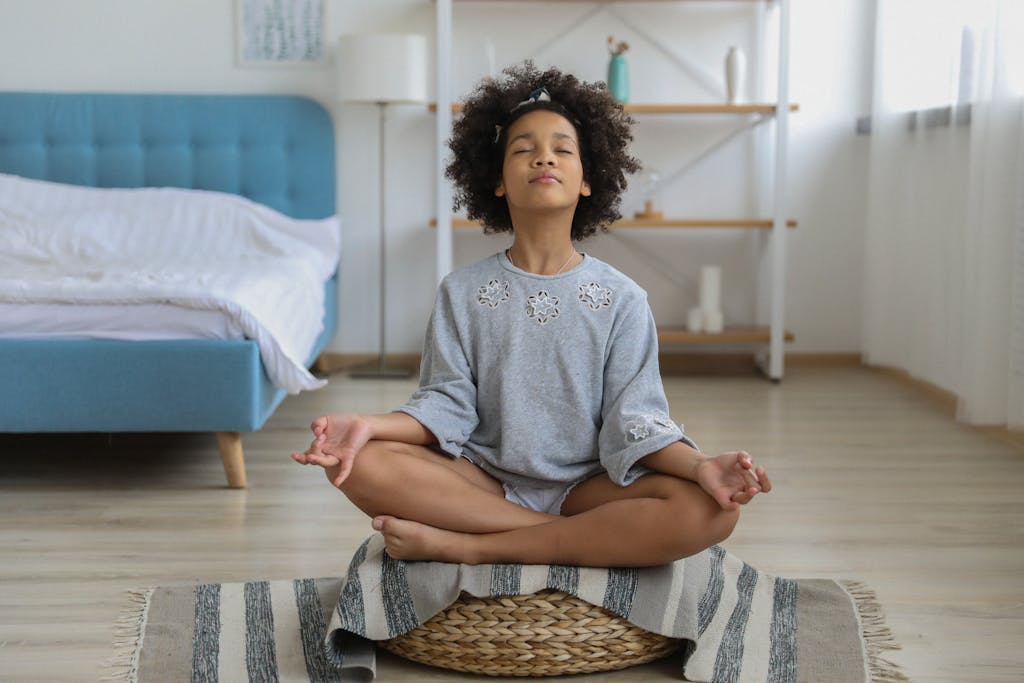
Press PLAY to listen to this post.
Kids are naturally imaginative, and Halloween amplifies that! Yoga taps into this creativity with themed poses and mindful movement that feel more like play than practice. It’s a great way to balance the sugar rush and overstimulation that often come with the holiday.
🧘 Halloween-Inspired Poses
- Black Cat Pose (Cat-Cow): Stretch the spine while pretending to be a spooky feline.
- Zombie Walks (Mindful Marching): Practice balance and coordination with slow, exaggerated steps.
- Bat Pose (Happy Baby): Lie on your back and grab your feet—just like a bat hanging upside down!
- Pumpkin Breaths: Inhale deeply and puff up like a round pumpkin, then exhale slowly to deflate.
These poses help kids build body awareness, calm their nervous systems, and have a blast while doing it.
🎭 Mindfulness in Disguise
Halloween yoga isn’t just silly fun—it’s a chance to teach emotional regulation and self-expression. Through breath-work and movement, kids learn how to manage excitement, anxiety, and transitions. It’s also a great opportunity to talk about facing fears and finding inner strength—just like a brave little ghost or superhero.
🍬 Treats for the Mind and Body
Instead of just focusing on candy, Halloween yoga encourages kids to treat themselves to:
- A moment of stillness
- A deep breath before trick-or-treating
- A playful way to connect with friends and family
So this Halloween, roll out the mat and invite kids to move, breathe, and play. Yoga adds a magical twist to the holiday—and helps children feel strong, centered, and ready for whatever spooky surprises come their way.
Happy Halloween from It’s Yoga Kids®! 🎃🧘♂️🕸️ Come in costume on Sunday, October 26!

Press PLAY to listen to this post.
October 10th marks World Mental Health Day, a global reminder that mental well-being is just as vital as physical health—especially for children and teens. As we face a growing youth mental health crisis, it’s more important than ever to equip kids with tools that help them thrive emotionally, physically, and socially.
📊 The Mental Health Crisis in Numbers
Recent studies reveal alarming trends:
- Anxiety and depression rates among children have surged. In the U.S., feelings of persistent sadness and hopelessness increased by 40% over the past decade.
- Suicide is now the second leading cause of death for youth ages 12–24.
- During the pandemic, moderate-to-severe depression rose from 10.5% to 15.1% among 11–13-year-olds, with girls and Hispanic/Latinx youth most affected.
These numbers reflect more than statistics—they represent real children struggling to cope with stress, isolation, and uncertainty.
🧘♀️ How Yoga Supports Mental Health
Yoga offers a powerful, accessible way to help kids regulate their bodies and minds. Through breath-work, movement, and mindfulness, children learn to:
- Calm their nervous systems
- Recognize and manage emotions
- Build self-awareness and focus
Yoga isn’t just about flexibility—it’s about mental agility, emotional strength, and inner peace.
💪 The It’s Yoga Kids® 3 Success Skills
At It’s Yoga Kids®, we focus on three core skills that help children become the best version of themselves:
- Adaptability Life is full of change. Yoga teaches kids to adjust with grace—whether it’s a new school, a tough game, or a challenging pose. Adaptability helps them stay open, curious, and calm in the face of uncertainty.
- Resilience Falling out of a pose is part of the process. Yoga shows kids that setbacks are not failures—they’re opportunities to grow. Resilience builds emotional strength and the ability to bounce back from adversity.
- Confidence Mastering a pose or simply showing up on the mat gives kids a sense of achievement. Yoga nurtures self-belief, helping children trust their bodies, their choices, and their voice.
🌱 Moving Forward Together
On World Mental Health Day, let’s commit to supporting children not just with care, but with skills. Yoga empowers kids to navigate life’s challenges with balance, strength, and joy. It’s more than a practice—it’s a pathway to lifelong well-being.
Let’s raise awareness, reduce stigma, and build a future where every child has the tools to thrive. Start HERE: Get a freebie. Come to class. Take a training!

Press PLAY to listen to this post.
October 6th marks National Coaches Day, a time to honor the mentors who shape not just athletes—but confident, resilient human beings. (Check out this post that brought me to tears!) This year, we join Positive Coaching Alliance in saying Thank You, Coach for the countless hours, heart, and wisdom poured into every practice, pep talk, and game day.
Coaches do more than teach skills—they build character. And now, many are expanding their toolkit by becoming Kids Yoga Certified, recognizing that athletic performance is deeply tied to mental focus, emotional regulation, and physical safety.
Here’s why yoga is becoming a game-changer for student athletes:
🧘♂️ Body Awareness & Injury Prevention Yoga teaches athletes how to move with intention, improve flexibility, and build core strength. Coaches are using yoga to help kids understand their bodies better—reducing the risk of injury and promoting longevity in their sport.
🧠 Mental Focus & Emotional Resilience Breath-work and mindfulness practices sharpen concentration and calm nerves before competition. Whether it’s managing pre-game jitters or bouncing back from a tough loss, yoga equips athletes with tools to stay grounded and mentally strong.
❤️ Playing for the Love of the Game Yoga reminds kids why they started playing in the first place: joy, connection, and passion. Coaches who integrate yoga into training help athletes reconnect with their love for movement, fostering a healthy mindset that supports long-term engagement.
So today, we celebrate the coaches who are evolving, adapting, and leading with heart. By embracing yoga, they’re not just building better athletes—they’re nurturing whole, balanced individuals.
Thank you, Coach, for believing in kids, for showing up, and for helping them grow on and off the field. You are the true MVP. 🏆🧘♀️👏
Get your FREE Coaching Guide: 5 Keys to Level Up Student Athlete Performance HERE.

Press PLAY to listen to this post.
A recent New York Times piece highlighted a key insight: self-control isn’t about gritting your teeth—it’s a skill that can be nurtured. When kids learn to pause, breathe, and redirect their attention, they strengthen the very muscles of willpower. Yoga is one of the simplest, most effective ways to help kids practice this skill daily.
Through mindful breathing, balancing poses, and relaxation practices, yoga helps children:
- Pause before reacting when emotions run high.
- Build focus by paying attention to breath and body.
- Strengthen resilience when facing challenges at school or home.
These skills translate into better classroom behavior, stronger learning outcomes, and healthier relationships.
The State of San Francisco Schools
A recent Neighbors for a Better San Francisco poll shows just how much these tools are needed. Trust in the district is shaken:
- Only 9% of San Franciscans think SFUSD is moving in the right direction.
- Among public school parents, just 8% agree, while 51% say the district is headed in the wrong direction.
Parents want schools to return to basics:
- 73% prioritize improving academic performance for all students.
- 66% want stronger literacy and math outcomes.
- 52% seek expanded access to college and career pathways.
On ethnic studies, most parents support the state’s one-semester requirement, with goals of cultural awareness (49%), understanding U.S. history (49%), and preparing students for a diverse society (47%). Still, major concerns remain about consistency (63%), displacement of advanced classes (63%), and transparency (61%).
Looking Beyond the District: New Models for Education
Given these challenges, families are seeking alternatives that combine academic excellence with emotional well-being. Programs like Coherence Education offer a fresh model—integrating project-based learning with emotional intelligence and mindfulness. By cultivating self-control, curiosity, and resilience, this approach prepares students not just for tests, but for life.
Bottom line: With trust in traditional systems faltering, schools must return to proven fundamentals—while also equipping kids with tools like yoga to navigate stress, strengthen self-control, and thrive in today’s complex world.
